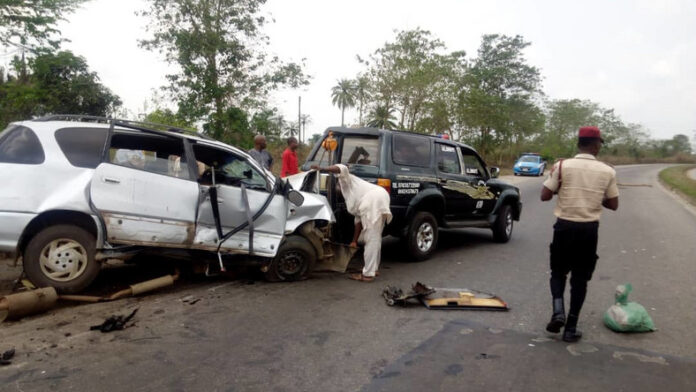Ending the tragedy of road accidents in Nigeria, by Solomon Dilibe Obinna
Road crashes have become one of the deadliest yet most overlooked public health challenges in Nigeria. Every week, headlines carry grim reports of accidents that claim the lives of students, professionals, traders, and breadwinners, leaving countless families devastated. These accidents disproportionately affect people in their most productive years, robbing the nation of valuable human capital and entrenching poverty in households suddenly stripped of their providers.
The scale of the crisis is staggering. According to estimates, thousands die annually on Nigerian roads, with many more injured or permanently disabled. Yet, the recurring nature of these accidents has made the tragedies seem normal, almost inevitable. This complacency is dangerous because road accidents are not acts of fate—they are largely preventable with the right policies, infrastructure, and enforcement.
The causes of road accidents in Nigeria are painfully familiar. Poorly maintained roads riddled with potholes turn every journey into a gamble. Reckless driving habits, including overspeeding, drunk driving, and blatant disregard for traffic laws, continue to fuel crashes. Added to this are poorly serviced vehicles, particularly commercial buses and trucks that should not be on the highways. The danger is compounded by the menace of heavy-duty vehicles and petroleum tankers, whose accidents often lead to catastrophic explosions.
READ ALSO: Rethinking Education: The urgent need for vocational training in Nigeria, by Solomon Dilibe Obinna
Unfortunately, government response has been inconsistent and insufficient. While aviation safety receives enormous resources and strict oversight—despite being used by a fraction of the population—road safety, which affects millions daily, is treated with neglect. This imbalance underscores a lack of political will to confront the issue of road carnage with the seriousness it demands.
The Federal Road Safety Corps (FRSC), the primary agency tasked with promoting road safety, remains overstretched and underpowered. For years, it has operated with inadequate manpower, limited funding, and logistical constraints. Its absence in many Local Government Areas means that enforcement of traffic rules and rapid response to emergencies remain weak in vast parts of the country. Without a comprehensive presence across all 774 LGAs, the FRSC cannot effectively fulfil its mandate.
To reverse the trend, strengthening the FRSC must become a national priority. This requires increased budgetary allocation, recruitment of more personnel, and provision of modern tools to aid monitoring and enforcement. Beyond resources, the agency must also be given stronger legal authority to prosecute offenders swiftly and decisively. Reckless drivers must no longer escape accountability because of political influence or weak enforcement structures.
READ ALSO: Tackling the menace of kidnapping, by Rahama Haruna Umar
At the same time, state governments cannot remain passive. States without road traffic management agencies must establish them immediately. Those already in existence must work hand-in-hand with the FRSC, creating a coordinated framework for road safety enforcement. The collaboration between federal and state agencies should be backed by data-sharing, technology, and joint patrols to make the roads safer.
Public enlightenment is another critical tool in reducing accidents. Campaigns to educate drivers about safe road practices, dangers of overspeeding, and the importance of vehicle maintenance must be sustained and intensified. The culture of reckless driving thrives partly because many drivers are either unaware of the risks or dismissive of them. Changing attitudes will require persistent education and visible enforcement of penalties.
Equally, Nigeria’s dilapidated road infrastructure demands urgent attention. The poor state of highways and rural roads is a major contributor to road crashes. Massive investment in road rehabilitation, construction of safer highways, and proper signage is essential. Roads must be built with standard safety features such as barriers, lighting, and pedestrian crossings. Without safe infrastructure, even the best enforcement efforts will yield limited results.
Technology should also be embraced as a game-changer. Surveillance cameras, speed detectors, and digital monitoring systems should be deployed on major highways to track offenders and improve accountability. In addition, the creation of a centralised database for drivers and vehicles would help identify repeat offenders and ensure that penalties are enforced consistently.
READ ALSO: Building inclusive AI literacy for Nigeria’s digital future, by Esther James Killi
The private sector can contribute significantly to tackling this menace. Insurance companies, transport unions, and vehicle manufacturers all have a stake in safer roads. By partnering with the government in awareness campaigns, driver training, and vehicle inspection initiatives, the burden of road safety can be shared more effectively.
It is equally important to empower first responders and medical facilities. Many accident victims die not from the crash itself but from delays in accessing medical care. Equipping local health centres near highways and training paramedics can drastically reduce fatalities. Quick intervention can mean the difference between life and death.
The economic toll of road accidents is often overlooked. Beyond the human tragedy, crashes cost billions annually in healthcare expenses, lost productivity, and property damage. Nigeria cannot afford to keep losing lives and resources to largely preventable problems. Safer roads are not just a moral imperative but an economic necessity.
READ ALSO: Repercussions of early electioneering campaign activities, by Ayuba Ahmad
Nonetheless, the solution lies in political will. Government at all levels must stop paying lip service to road safety and treat it as the national emergency that it is. Every life lost on the highways is one too many, and the time has come to act with urgency and commitment.
Road crashes are not natural disasters; they are preventable tragedies. With the right policies, better infrastructure, strict enforcement, and collective responsibility, Nigeria can drastically reduce the number of lives lost on its roads. The message is simple but powerful: enough of preventable deaths. The government must act now—firmly and decisively.
Solomon Dilibe Obinna is a student of Mass Communication at the Muhammadu Buhari University of Maiduguri (formerly University of Maiduguri), Borno State.
Follow the Neptune Prime channel on WhatsApp:
Do you have breaking news, interview request, opinion, suggestion, or want your event covered? Email us at neptuneprime2233@gmail.com





